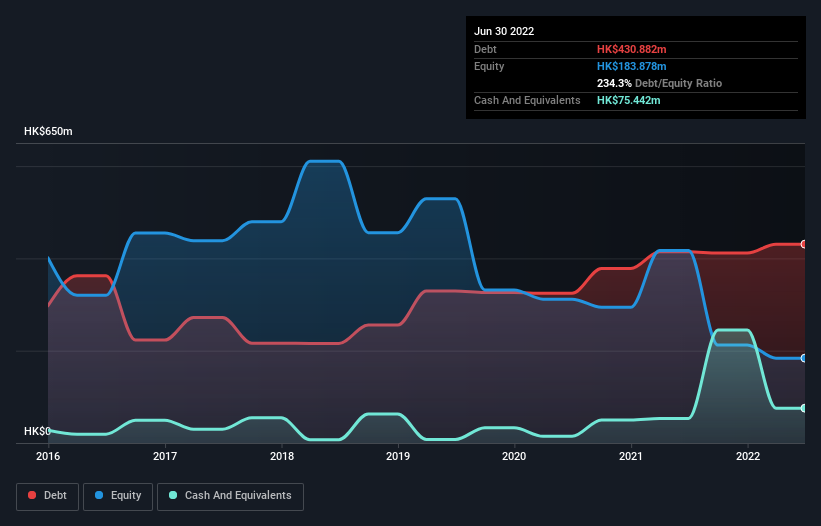These 4 Measures Indicate That Kiu Hung International Holdings (HKG:381) Is Using Debt Extensively

Some say volatility, rather than debt, is the best way to think about risk as an investor, but Warren Buffett famously said that 'Volatility is far from synonymous with risk.' It's only natural to consider a company's balance sheet when you examine how risky it is, since debt is often involved when a business collapses. We can see that Kiu Hung International Holdings Limited (HKG:381) does use debt in its business. But the real question is whether this debt is making the company risky.
When Is Debt A Problem?
Debt assists a business until the business has trouble paying it off, either with new capital or with free cash flow. Ultimately, if the company can't fulfill its legal obligations to repay debt, shareholders could walk away with nothing. However, a more usual (but still expensive) situation is where a company must dilute shareholders at a cheap share price simply to get debt under control. Of course, debt can be an important tool in businesses, particularly capital heavy businesses. When we examine debt levels, we first consider both cash and debt levels, together.
View our latest analysis for Kiu Hung International Holdings
How Much Debt Does Kiu Hung International Holdings Carry?
As you can see below, Kiu Hung International Holdings had HK$430.9m of debt, at June 2022, which is about the same as the year before. You can click the chart for greater detail. However, it does have HK$75.4m in cash offsetting this, leading to net debt of about HK$355.4m.

How Healthy Is Kiu Hung International Holdings' Balance Sheet?
Zooming in on the latest balance sheet data, we can see that Kiu Hung International Holdings had liabilities of HK$636.1m due within 12 months and liabilities of HK$83.9m due beyond that. On the other hand, it had cash of HK$75.4m and HK$73.4m worth of receivables due within a year. So its liabilities outweigh the sum of its cash and (near-term) receivables by HK$571.0m.
This deficit casts a shadow over the HK$82.9m company, like a colossus towering over mere mortals. So we definitely think shareholders need to watch this one closely. After all, Kiu Hung International Holdings would likely require a major re-capitalisation if it had to pay its creditors today.
We measure a company's debt load relative to its earnings power by looking at its net debt divided by its earnings before interest, tax, depreciation, and amortization (EBITDA) and by calculating how easily its earnings before interest and tax (EBIT) cover its interest expense (interest cover). The advantage of this approach is that we take into account both the absolute quantum of debt (with net debt to EBITDA) and the actual interest expenses associated with that debt (with its interest cover ratio).
Weak interest cover of 0.20 times and a disturbingly high net debt to EBITDA ratio of 7.0 hit our confidence in Kiu Hung International Holdings like a one-two punch to the gut. This means we'd consider it to have a heavy debt load. However, the silver lining was that Kiu Hung International Holdings achieved a positive EBIT of HK$8.8m in the last twelve months, an improvement on the prior year's loss. The balance sheet is clearly the area to focus on when you are analysing debt. But it is Kiu Hung International Holdings's earnings that will influence how the balance sheet holds up in the future. So if you're keen to discover more about its earnings, it might be worth checking out this graph of its long term earnings trend.
But our final consideration is also important, because a company cannot pay debt with paper profits; it needs cold hard cash. So it is important to check how much of its earnings before interest and tax (EBIT) converts to actual free cash flow. Over the last year, Kiu Hung International Holdings actually produced more free cash flow than EBIT. That sort of strong cash generation warms our hearts like a puppy in a bumblebee suit.
Our View
To be frank both Kiu Hung International Holdings's interest cover and its track record of staying on top of its total liabilities make us rather uncomfortable with its debt levels. But on the bright side, its conversion of EBIT to free cash flow is a good sign, and makes us more optimistic. We're quite clear that we consider Kiu Hung International Holdings to be really rather risky, as a result of its balance sheet health. So we're almost as wary of this stock as a hungry kitten is about falling into its owner's fish pond: once bitten, twice shy, as they say. There's no doubt that we learn most about debt from the balance sheet. However, not all investment risk resides within the balance sheet - far from it. For instance, we've identified 4 warning signs for Kiu Hung International Holdings (3 make us uncomfortable) you should be aware of.
When all is said and done, sometimes its easier to focus on companies that don't even need debt. Readers can access a list of growth stocks with zero net debt 100% free, right now.
New: Manage All Your Stock Portfolios in One Place
We've created the ultimate portfolio companion for stock investors, and it's free.
• Connect an unlimited number of Portfolios and see your total in one currency
• Be alerted to new Warning Signs or Risks via email or mobile
• Track the Fair Value of your stocks
Have feedback on this article? Concerned about the content? Get in touch with us directly. Alternatively, email editorial-team (at) simplywallst.com.
This article by Simply Wall St is general in nature. We provide commentary based on historical data and analyst forecasts only using an unbiased methodology and our articles are not intended to be financial advice. It does not constitute a recommendation to buy or sell any stock, and does not take account of your objectives, or your financial situation. We aim to bring you long-term focused analysis driven by fundamental data. Note that our analysis may not factor in the latest price-sensitive company announcements or qualitative material. Simply Wall St has no position in any stocks mentioned.
About SEHK:381
AOM International Group
An investment holding company, manufactures and trades in toys and gifts.
Proven track record slight.
Market Insights
Community Narratives




